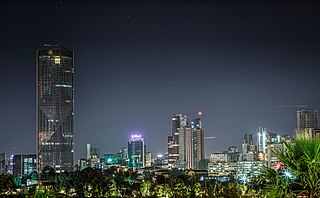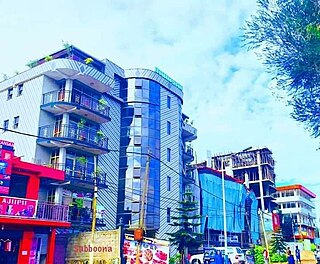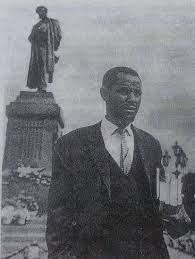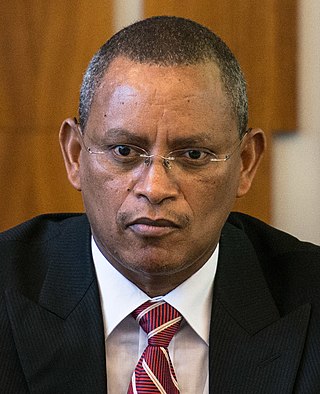Telecommunications in Ethiopia is a monopoly in the control of Ethio telecom, formerly the Ethiopian Telecommunications Corporation (ETC). As of 2012, 20.524 million cellular phones and 797,500 main line phones were in use.

Addis Ababa is the capital and largest city of Ethiopia. In the 2007 census, the city's population was estimated to be 2,739,551 inhabitants. Addis Ababa is a highly developed and important cultural, artistic, financial and administrative centre of Ethiopia.

Addis Ababa University (AAU) is a national university located in Addis Ababa, Ethiopia. It is the oldest university in Ethiopia. AAU has thirteen campuses. Twelve of these are situated in Addis Ababa, and one is located in Bishoftu, about 45 kilometres (28 mi) away. AAU has several associated research institutions including the Institute of Ethiopian Studies. The Ministry of Education admits qualified students to AAU based on their score on the Ethiopian University Entrance Examination (EUEE).

Dire Dawa is a city in eastern Ethiopia near the Oromia and Somali Region border and one of two chartered cities in Ethiopia. Dire Dawa alongside present-day Sitti Zone were a part of the Dire Dawa autonomous region stipulated in the 1987 Ethiopian Constitution until 1993 when it was split by the federal government into a separately administered chartered city.

Ambo is a town in west-central Ethiopia. Located in the West Shewa Zone of Oromia Region, west of Addis Ababa, it is the capital city of West Shewa zone. This town has a latitude and longitude of 8°59′N37°51′E and an elevation of 2,101 meters.

Nekemte, also spelled as Neqemte, is a market city and separate woreda in western Ethiopia. Located in the East Welega Zone of the Oromia Region, Nekemte has a latitude and longitude of 9°5′N36°33′E and an elevation of 2,088 meters.
The Ethiopian Democratic Union or EDU, also known as Teranafit, was one of the political parties that formed in opposition to the Derg regime of Ethiopia. It merged with the Ethiopian Democratic Party to form the Ethiopian Democratic Unity Party.

The mass media in Ethiopia consist of radio, television and the Internet, which remain under the control of the Ethiopian government, as well as private newspapers and magazines. Ten radio broadcast stations, eight AM and two shortwave, are licensed to operate in Ethiopia. The major radio broadcasting stations include Radio Fana a private station, Radio Voice of One Free Ethiopia, and the Voice of the Revolution of Tigray. The only terrestrial (broadcast) television networks are government owned and include EBC and other regional stations. In keeping with government policy, radio broadcasts occur in a variety of languages including Amharic, Afaan Oromo, Tigrigna, and more. There are also many video sharing websites which are a popular way of getting information as well as entertainment in Ethiopia.
Radio Freedom also called Radio Zambia was a South African radio arm of the African National Congress (ANC) and its fighting wing Umkhonto we Sizwe (MK) during the anti-Apartheid struggle from the 1970s through the 1990s. It was the oldest liberation radio station in Africa. Listening to Radio Freedom in Apartheid-era South Africa was a crime carrying a penalty of up to eight years in prison.

The Ethiopian Red Terror, also known as the Qey Shibir, was a violent political repression campaign of the Derg against other competing Marxist-Leninist groups in Ethiopia and present-day Eritrea from 1976 to 1978. The Qey Shibir was an attempt to consolidate Derg rule during the political instability after their overthrow of Emperor Haile Selassie in 1974 and the subsequent Ethiopian Civil War. The Qey Shibir was based on the Red Terror of the Russian Civil War, and most visibly took place after Mengistu Haile Mariam became chairman of the Derg on 3 February 1977. It is estimated that 10,000 to 980,000 people were killed over the course of the Qey Shibir.
Radio Voice of the Gospel (RVOG) was a Lutheran World Federation international radio station based in the Ethiopian capital Addis Ababa, starting in 1961.

The Ethio-Djibouti Railway is a metre gauge railway in the Horn of Africa that once connected Addis Ababa to the port city of Djibouti. The operating company was also known as the Ethio-Djibouti Railways. The railway was built in 1894–1917 to connect the Ethiopian capital city to French Somaliland. During early operations, it provided landlocked Ethiopia with its only access to the sea. After World War II, the railway progressively fell into a state of disrepair due to competition from road transport.

Berhanu Zerihun was an Ethiopian writer in Amharic and journalist, noted for his clear and crisp writing style, which contrasted against the more complex writing style popular in his time.

The 1960 Ethiopian coup d'etat attempt was perpetrated against Emperor Haile Selassie on 13 December 1960. The Council of the Revolution, four conspirators led by brothers Germame Neway and Brigadier General Mengistu Neway, commander of the Kebur Zabagna, sought to overthrow the Emperor during a state visit to Brazil in order to install a progressive government. The coup leaders declared the beginning of a new government under the rule of Haile Selassie's eldest son, Crown Prince Asfaw Wossen, that would address the numerous economic and social problems Ethiopia faced. The Council gained control of most of the capital city, Addis Ababa, and took several ministers and other important people hostage. After its initial success, the majority of the military and populace quickly aligned against the coup, and by 17 December loyalists had regained control of Addis Ababa. At least 300 people were killed during the coup, including most of the conspirators.
Captain Alemayehu Haile was a member of the Derg, the military junta that ruled Ethiopia from 1974 to 1987.
Alemu Abebe is an Ethiopian politician. He served as mayor of Addis Ababa during the years of Red Terror.

Debretsion Gebremichael is an Ethiopian politician serving as the chairman of Tigray People's Liberation Front (TPLF). He was previously the president of the Tigray Region. His position as titular head of the Tigray Region was disputed by the federal government of Ethiopia who in November 2020 appointed Mulu Nega as the chief executive of the Transitional Government of Tigray, succeeded by Abraham Belay. From July 2021 to March 2023, Debretsion again led the Tigray Region, while Abraham Belay left the transitional government to become Ethiopia's minister of Defence.

Radio in Ethiopia was introduced during Emperor Haile Selassie regime in 1933 where the first radio station was built in 1931. On 31 January 1935, with assistance of the Italian contractor firm Ansaldo, the largest and more powerful station was built and the Emperor delivered the first speech in the broadcast.
Woizero Elleni Mekuria or Ellene Mocria (1941–2021) was an Ethiopian radio and television journalist. After joining the External Service of the Voice of Ethiopia in 1962, she was Ethiopia's first female radio newscaster and producer. In 1964, when Ethiopian Television began broadcasting, she became Ethiopia's first woman television journalist.










